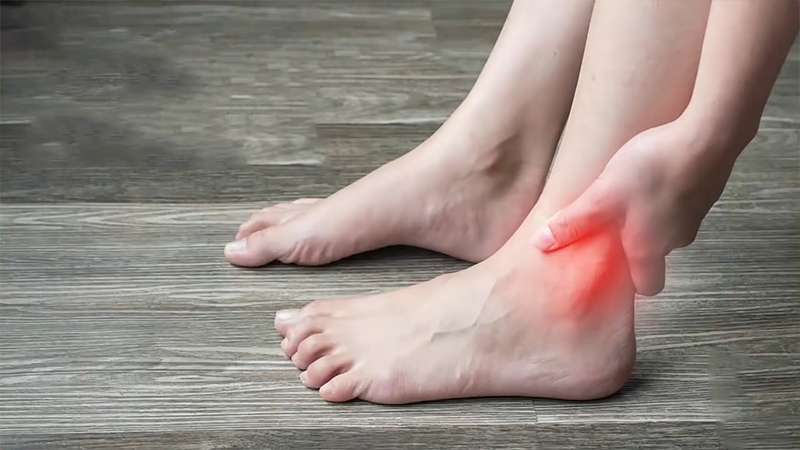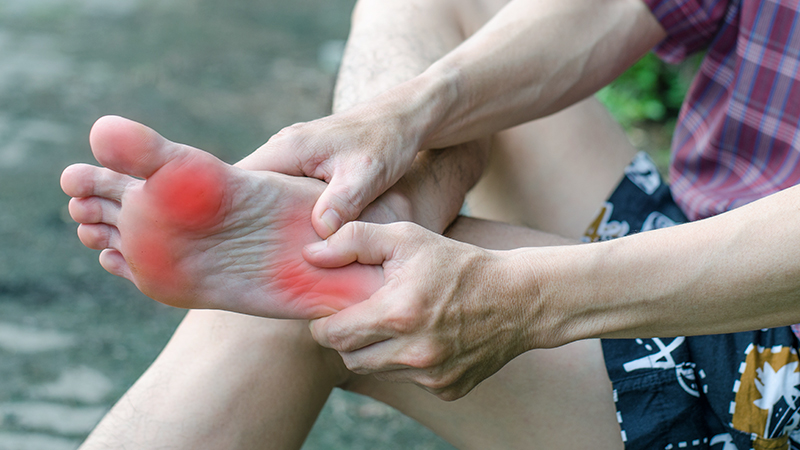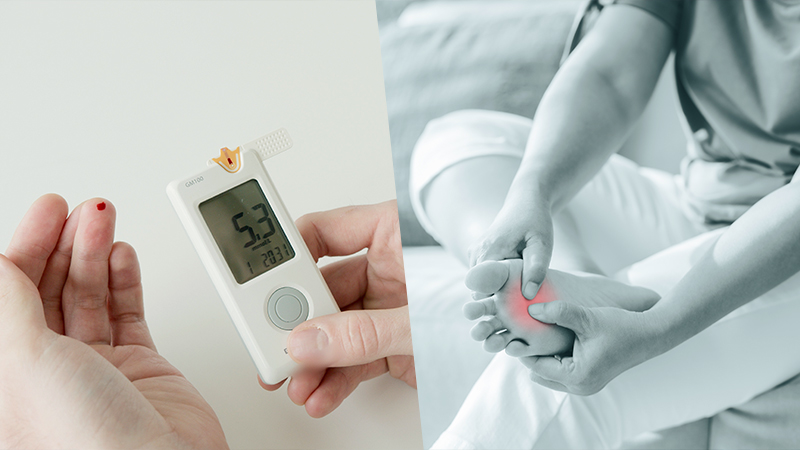Have you ever experienced that peculiar sensation of tingling or numbness in your feet after a hearty meal?
If so, you’re not alone. While it might seem puzzling, this phenomenon, known as “postprandial peripheral neuropathy,” can have a range of causes and implications.
In this blog post, we will delve into the intricacies of why your feet might tingle after eating.
From the moment food touches your taste buds to the final stages of digestion, numerous factors come into play, affecting everything from blood flow to nerve function.
We’ll explore how these elements interact, leading to the tingling sensation that catches many off guard.
Whether it’s a simple matter of blood sugar fluctuations or a sign of a more significant underlying issue like diabetes or food allergies, understanding why your feet tingle after eating is essential for your overall health and well-being.
So, let’s embark on this journey to demystify the post-meal tingles.
Is It Normal to Have Tingled Feet After Eating?

Experiencing tingling or numbness in the feet after eating is not necessarily normal, but it can occur due to various reasons.
One common cause is poor circulation, as digestion diverts blood flow to the stomach and intestines, temporarily reducing circulation in the extremities.
This can lead to a sensation of tingling or numbness, often referred to as “postprandial peripheral neuropathy.”
Additionally, certain medical conditions like diabetes can contribute to neuropathy and may exacerbate these symptoms.
However, if tingling in the feet after eating becomes persistent or is accompanied by other concerning symptoms such as pain, weakness, or dizziness, it is important to consult a healthcare professional.
They can assess your specific situation, perform necessary tests, and provide guidance or treatment options to address the underlying cause and ensure your overall health and well-being.
Why Does My Feet Tingle After Eating?
Tingling in the feet after eating can result from various factors, ranging from benign to potentially serious. Here are eight possible reasons, each explained elaborately:
Poor Circulation
After a meal, blood is redirected to the digestive system to aid in digestion. This temporary shift can reduce blood flow to the extremities, leading to tingling or numbness.
This is often referred to as “postprandial peripheral neuropathy.”
Carbohydrate Sensitivity
Some individuals may experience tingling or a sudden rise and fall in blood sugar levels after consuming large quantities of carbohydrates, which can result in a condition known as reactive hypoglycemia.
Rapid sugar fluctuations can affect nerve function, causing tingling sensations.
Food Allergies
Allergic reactions to certain foods can manifest as tingling or itching sensations, sometimes involving the feet. Anaphylaxis, a severe allergic reaction, can also cause tingling along with other life-threatening symptoms.
Gastrointestinal Disorders
Conditions like celiac disease or irritable bowel syndrome (IBS) can lead to malabsorption of nutrients and vitamins.
Nutritional deficiencies, particularly vitamin B12 deficiency, can cause peripheral neuropathy and tingling in the extremities.
Diabetes
High blood sugar levels in diabetics can damage nerves, a condition known as diabetic neuropathy. This can result in tingling, pain, or numbness in the feet, especially after eating when blood sugar levels spike.
Alcohol and Poor Nutrition
Excessive alcohol consumption can lead to thiamine (vitamin B1) deficiency, which can cause neuropathy and tingling in the feet. Poor overall nutrition can contribute to similar symptoms.
Medications
Some medications, including certain antibiotics, anticonvulsants, and chemotherapy drugs, may have peripheral neuropathy as a side effect. Tingling in the feet can occur as a result of these medications.
Underlying Health Conditions
Tingling in the feet can also be linked to underlying health issues such as multiple sclerosis, peripheral artery disease, or neurological disorders.
These conditions may become more noticeable after eating due to the redistribution of blood flow.
If you consistently experience tingling in your feet after eating or if the sensation is severe, persistent, or accompanied by other concerning symptoms, it is crucial to consult a healthcare professional.
They can perform the necessary evaluations, tests, and diagnostics to identify the underlying cause and provide appropriate treatment or management strategies tailored to your specific situation.
Feeling Pins and Needles Or Numbness on Feet After Eating

Experiencing pins and needles or numbness in the feet after eating, also known as “postprandial peripheral neuropathy,” can be a perplexing and uncomfortable sensation.
While it’s not entirely uncommon, it’s essential to understand why this phenomenon occurs. One primary reason for this sensation is related to blood flow.
When you consume a meal, especially a larger one, your body diverts a significant amount of blood to your digestive system to facilitate the breakdown and absorption of nutrients.
As a result, there is a temporary reduction in blood flow to other parts of the body, including the feet. This reduced circulation can lead to a feeling of pins and needles or numbness.
Another contributing factor can be fluctuations in blood sugar levels. After eating, particularly if the meal is rich in carbohydrates, your blood sugar levels may spike.
This sudden increase followed by a potential rapid decrease can affect nerve function, causing tingling or numbness in the feet.
Connection Between Blood Sugar Spikes and Tingling

The connection between blood sugar spikes and tingling sensations is closely related to how glucose levels affect nerve function and overall circulation.
Here’s an explanation of this relationship:
Glucose and Nerve Function
Your nerves rely on a consistent supply of glucose (sugar) for energy.
When your blood sugar levels rise significantly, such as after consuming a high-carbohydrate meal, the body responds by releasing insulin to help transport glucose into cells for energy use.
In some cases, this insulin response can lead to a rapid drop in blood sugar levels, causing what’s known as reactive hypoglycemia.
Reactive Hypoglycemia
Reactive hypoglycemia occurs when blood sugar levels spike after eating and then fall too low, too quickly.
These rapid fluctuations in blood sugar can affect nerve cells, leading to symptoms like tingling, numbness, dizziness, and shakiness. This is often referred to as a “sugar crash.”
Peripheral Neuropathy
Prolonged periods of high blood sugar, as seen in uncontrolled diabetes, can cause damage to nerves throughout the body, a condition known as peripheral neuropathy.
Neuropathy can manifest as tingling, numbness, burning sensations, or pain, primarily in the extremities like the feet and hands. Over time, nerve damage can become permanent.
Vasodilation and Circulation
High blood sugar levels can also lead to vasodilation, a widening of blood vessels.
While this can be a response to elevated glucose, it may contribute to poor circulation in the extremities, potentially exacerbating tingling sensations.
It’s important to note that while blood sugar spikes can lead to tingling, other factors can contribute to these sensations as well, such as underlying medical conditions, nutrient deficiencies, and medication side effects.
If you experience persistent or severe tingling or numbness, especially after meals, it is advisable to consult a healthcare professional.
They can perform tests to assess your blood sugar levels, evaluate your overall health, and determine the most appropriate course of action to manage and stabilize your blood sugar levels.
Food Allergies and Sensitivities That Trigger Tingling Sensations

Certain food allergies and sensitivities can trigger tingling sensations in various parts of the body, including the lips, tongue, throat, and extremities.
Here are some common examples:
Oral Allergy Syndrome (OAS)
OAS is a condition where individuals with pollen allergies experience tingling or itching sensations in the mouth, lips, and throat after consuming certain fruits, vegetables, and nuts.
This occurs because the proteins in these foods are structurally similar to pollen allergens, leading to a cross-reaction. Common triggers include apples, peaches, cherries, and almonds.
Shellfish Allergy
Shellfish allergies, including allergies to shrimp, crab, and lobster, can cause tingling and itching sensations in the mouth and throat shortly after ingestion.
Severe allergic reactions may lead to more widespread tingling, hives, and difficulty breathing.
Nuts and Peanut Allergies
Allergies to tree nuts (e.g., almonds, walnuts, cashews) and peanuts can cause tingling sensations in the mouth and lips upon contact or ingestion.
Anaphylactic reactions can occur in severe cases, leading to systemic tingling, difficulty breathing, and a drop in blood pressure.
MSG Sensitivity
Some individuals may experience tingling, known as “Chinese Restaurant Syndrome,” after consuming foods containing monosodium glutamate (MSG), a common flavor enhancer.
The symptoms can include tingling in the extremities, headache, and facial flushing.
Histamine Intolerance
Certain foods, such as aged cheeses, wine, and fermented products, contain histamine, which can trigger tingling sensations in individuals with histamine intolerance.
This condition can also cause other symptoms like hives, headaches, and digestive issues.
Foodborne Allergic Reactions
In some cases, food allergies can lead to anaphylaxis, a severe and life-threatening allergic reaction.
During anaphylaxis, tingling sensations can be widespread and accompanied by a range of symptoms, including difficulty breathing, swelling, and a drop in blood pressure.
Gluten Sensitivity
Gluten sensitivity or non-celiac gluten sensitivity (NCGS) can lead to various neurological symptoms, including tingling in the extremities.
This is distinct from celiac disease but can cause discomfort and tingling sensations in some individuals.
It’s crucial to differentiate between food allergies, sensitivities, and intolerances, as the severity and symptoms can vary widely.
If you suspect you have a food allergy or sensitivity, it’s essential to consult a healthcare professional for proper evaluation and testing.
Allergists can perform skin prick tests or blood tests to identify specific allergies, and they can provide guidance on dietary adjustments and potential treatments to manage symptoms and prevent reactions.
In cases of severe allergies, carrying epinephrine auto-injectors and having an emergency action plan is crucial.
What to Do When My Feet Tingle After Eating?

Experiencing tingling in your feet after eating can be discomforting, and the appropriate response depends on the underlying cause.
Here’s a general guideline on what to do when your feet tingle after a meal:
Monitor Your Symptoms
Pay attention to when and how often this sensation occurs. Note any other accompanying symptoms such as pain, weakness, dizziness, or changes in vision.
Keeping a symptom journal can be helpful for your healthcare provider.
Check for Allergies
If you suspect that a food allergy or sensitivity is causing the tingling, review your recent meals to identify potential triggers. Consider consulting an allergist for allergy testing and guidance on managing your diet.
Control Blood Sugar
If you have diabetes or suspect blood sugar fluctuations as the cause, monitor your blood glucose levels regularly.
Ensure you are following your diabetes management plan, including medication and dietary recommendations, and consult your healthcare provider for any necessary adjustments.
Stay Hydrated
Dehydration can exacerbate tingling sensations. Drink plenty of water throughout the day, especially if you consume high-sodium or salty foods that can contribute to fluid loss.
Manage Portion Sizes
Large, heavy meals can lead to temporary changes in blood flow and blood sugar levels. Consider eating smaller, more frequent meals to help prevent extreme spikes and drops in blood sugar.
Balance Your Diet
Aim for a balanced diet that includes a mix of carbohydrates, proteins, and healthy fats. This can help stabilize blood sugar levels and prevent sudden fluctuations.
Vitamin and Mineral Assessment
If you suspect nutrient deficiencies may be contributing to your symptoms, consult a healthcare provider for appropriate testing.
Addressing deficiencies, particularly in vitamins like B12, can help alleviate tingling in the feet.
Lifestyle Changes
If poor circulation is a concern, engage in regular physical activity to improve blood flow. Avoid sitting for extended periods after meals, and consider leg exercises and gentle stretching to promote circulation.
Consult a Healthcare Provider
If your tingling persists, worsens, or is accompanied by concerning symptoms, it’s essential to consult a healthcare provider.
They can perform a thorough evaluation, conduct relevant tests, and determine the underlying cause. Treatment options may include medication adjustments, dietary changes, or addressing any underlying medical conditions.
Emergency Situations
If you experience severe tingling, weakness, difficulty breathing, or other serious symptoms, seek immediate medical attention, as these could be signs of a severe allergic reaction or another medical emergency.
Remember that the cause of tingling in the feet after eating can vary widely, so it’s crucial to consult a healthcare professional for a proper diagnosis and personalized treatment plan tailored to your specific needs.
FAQs
Why do my feet tingle after eating?
Tingling in the feet after eating can occur due to changes in blood flow and blood sugar levels. Digestion diverts blood to the stomach and intestines, temporarily reducing circulation in the extremities.
Additionally, rapid spikes and drops in blood sugar can affect nerve function, causing tingling sensations.
Is it normal to have tingling in my feet after meals?
While it’s not entirely uncommon, persistent or severe tingling is not considered normal. It can be indicative of underlying issues like diabetes, food allergies, or nutrient deficiencies.
If you consistently experience this sensation, consult a healthcare professional for evaluation.
Can certain foods trigger tingling in the feet?
Yes, certain foods can trigger tingling sensations, especially if you have allergies or sensitivities.
Common culprits include shellfish, nuts, and foods high in monosodium glutamate (MSG). Allergic reactions can lead to tingling, itching, or more severe symptoms.
What should I do if my feet tingle after eating?
Start by monitoring your symptoms and dietary choices. Stay hydrated, eat balanced meals, and control portion sizes.
If tingling persists, consult a healthcare provider to determine the underlying cause. They can perform necessary tests and provide guidance or treatment options.
Can tingling in the feet after eating be a sign of a medical emergency?
In most cases, tingling after eating is not a medical emergency.
However, if it is severe, accompanied by difficulty breathing, swelling, or other severe symptoms, it could indicate a severe allergic reaction and warrants immediate medical attention.
Always err on the side of caution in such situations.
Wrapping Up
In the quest to understand why your feet tingle after eating, we’ve uncovered a complex interplay of factors, from blood sugar levels and digestion to allergies and underlying medical conditions.
While occasional tingling may not be cause for alarm, persistent or severe sensations should not be ignored.
The key takeaway is the importance of listening to your body and seeking professional guidance when needed.
Whether it’s adjusting your diet, monitoring your blood sugar, or consulting a healthcare provider, taking proactive steps can help alleviate discomfort and ensure your overall health remains on the right track.
Remember, our bodies have unique ways of communicating with us, and paying attention to these signals is a fundamental aspect of self-care.
So, the next time your feet tingle after a meal, you’ll have a better understanding of why it’s happening and how to respond appropriately.
I am a fitness instructor and I have been in the industry for 9 years. I have a passion for health and fitness.
I am a fitness instructor with over 9 years of experience in the industry. My passion is health and fitness and I would love to share my knowledge with you!